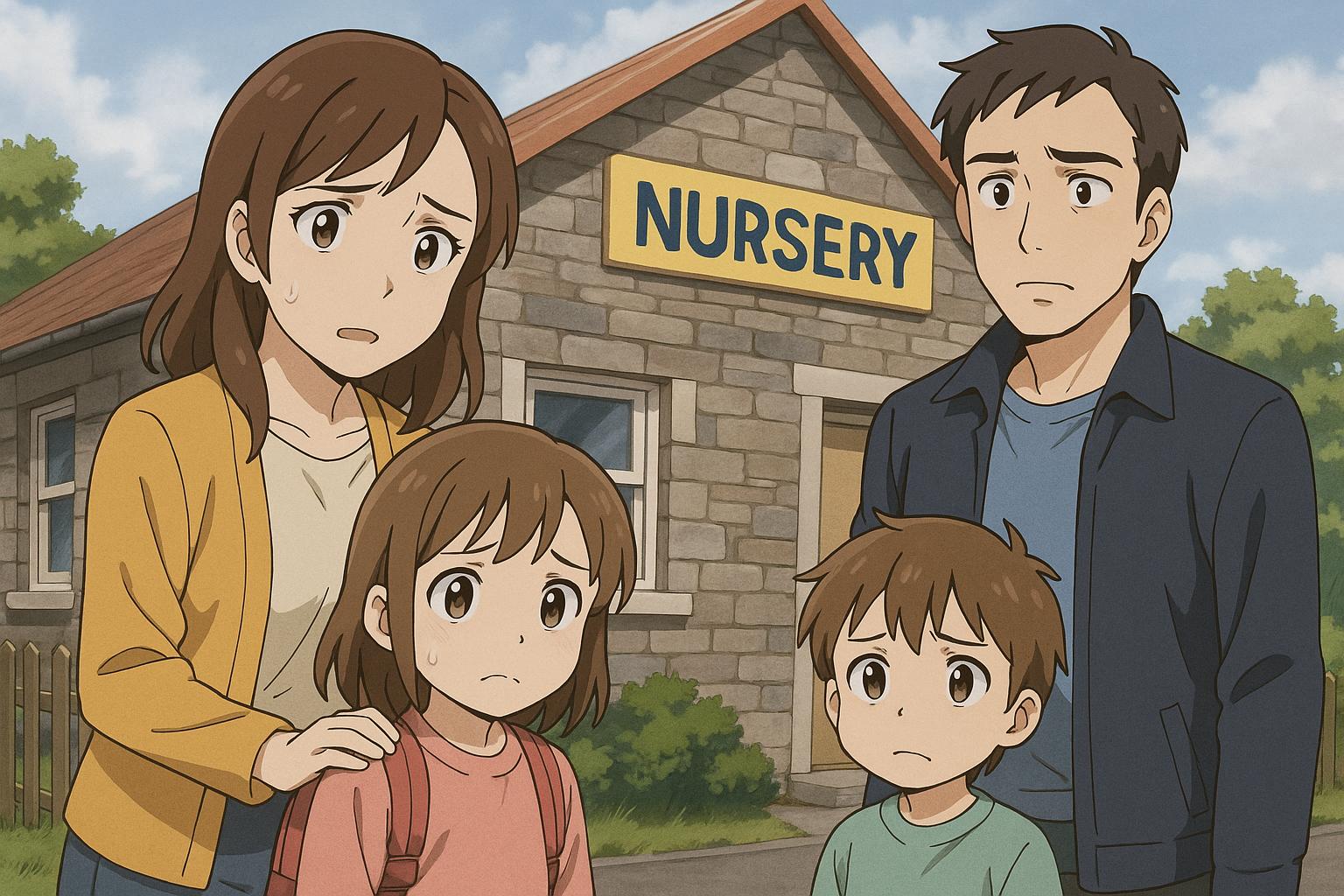Parents in the Scottish Borders have expressed frustration and distrust following the council’s decision to introduce composite classes in nurseries rather than close them, amid concerns over consultation transparency and the impact on children’s learning.
The discourse surrounding early years education in the Scottish Borders has reached a critical juncture, as the Scottish Borders Council’s recent decisions on nursery provision have stirred both optimism and discontent among parents. The council’s executive committee, which in April voted to explore the mothballing of several nurseries, ultimately pivoted to implement composite classes at three specific nurseries: Channelkirk, Ednam, and Cockburnspath. This decision reflects an attempt to balance operational efficiency while still providing essential educational services to young children amidst considerable parental concern.
Composite classes are intended to merge early learning and childcare (ELC) with primary pupils of different ages, specifically combining ELC with Primary 1 at Channelkirk and Ednam, and ELC with Primary 2 at Cockburnspath. While this approach has been presented as a viable alternative to closure, there is palpable frustration among parents regarding the transparency and integrity of the consultation process that led to this outcome. A Channelkirk parent voiced dissatisfaction with the consultation, describing it as a “sham” and expressing feelings of distrust that the proposals evolved into a fait accompli. The sentiment has been echoed across multiple nurseries, indicating a wider concern regarding the adequacy and sincerity of the council’s engagement with families.
Data from similar situations indicate a pattern of tension between councils and communities over early years provision. In May, the council had to revise its decision to close five nurseries—Cockburnspath, Ednam, Oxton, Yetholm, and Walkerburn—following vehement protests from parents who feared adverse effects on their children’s education. This move was lauded as a necessary shift towards ensuring stability amid the crisis surrounding early childhood education contacts in the region.
Moreover, earlier attempts to close early years centres in Westruther and Fountainhall highlighted similar concerns of inadequate consultation and a lack of consideration for families who would need to travel further for alternative childcare. Rachael Hamilton, an MSP, publicly advocated for better communication and participated in efforts to halt proposed closures, stressing the importance of community engagement.
In light of the latest decisions, the council has drawn criticism for a perceived absence of empirical evidence to support the shift to composite classes. Parents at the affected nurseries have raised valid inquiries about the educational and social implications of such arrangements, which still lack comprehensive reports outlining possible impacts. Although the council claimed to have used this model successfully in the past, parents remain sceptical and seek clarity regarding how these changes will ultimately affect their children’s learning environments.
As the scheduled implementation date approaches, the council is tasked with gaining approval from the Care Inspectorate, amidst a backdrop of unresolved issues raised by parents. The notion of working collaboratively has gained traction within the council, which signals an intention to form a working group to develop a comprehensive mothballing policy. This offers a glimmer of hope that parent involvement may enhance the legitimacy and effectiveness of future decision-making processes.
Given the past turmoil, it is paramount for parents to maintain an active role in discussions about education policy. As Paul Fulton, a parent from Channelkirk, aptly highlighted, the importance of transparency and collaboration cannot be overstressed. Parents believe they possess valuable insights that could inform the council’s strategy, ensuring that their voices are not merely seen as obstacles, but as integral contributors to the future of early learning and childcare in their communities.
The path forward seems fraught with challenges, yet if lessons are to be learned from previous missteps, there is a meaningful opportunity for reconciliation between the council and parents. Engaging openly with stakeholders will be essential to restoring trust and facilitating a more collaborative approach to the educational needs of young children across the Scottish Borders.
Reference Map:
- Paragraph 1 – [1], [2]
- Paragraph 2 – [1], [3]
- Paragraph 3 – [4], [5]
- Paragraph 4 – [6], [1]
- Paragraph 5 – [4], [1]
- Paragraph 6 – [2], [1]
Source: Noah Wire Services
- https://www.heraldscotland.com/news/25204433.nursery-parents-frustrated-misleading-information/?ref=rss – Please view link – unable to able to access data
- https://www.itv.com/news/border/2025-05-09/five-nurseries-saved-from-closure-following-outcry-from-parents – In May 2025, Scottish Borders Council reversed its decision to temporarily close five nurseries—Cockburnspath, Ednam, Oxton, Yetholm, and Walkerburn—after significant parental opposition. The council acknowledged the need to explore alternative models to maintain early years education in these communities, aiming to provide certainty to parents and children for the upcoming school session. This decision followed protests and concerns raised by parents regarding the impact of closures on their families and local communities.
- https://www.bbc.co.uk/news/articles/c99z08zx024o – In April 2024, Scottish Borders Council announced the closure of early years centres in Westruther and Fountainhall due to low enrolment numbers. Parents expressed frustration over the lack of consultation, highlighting the inconvenience and potential impact on their children’s education. The closures would require families to travel significant distances to alternative nurseries, raising concerns about the future of rural education and childcare services in these communities.
- https://www.scotborders.gov.uk/news/article/4768/special-council-meeting-friday-9-may-2025 – On 9 May 2025, Scottish Borders Council held a special meeting to reconsider its earlier decision to mothball several nurseries. The council agreed to explore alternative models, including composite classes, to maintain early learning and childcare provision in affected areas. A three-week consultation with parents and caregivers was initiated to discuss these proposals, aiming to provide clarity and certainty for the upcoming school session.
- https://www.scottishbordersconservatives.org.uk/news/local-msp-seeks-public-meeting-prevent-westruther-nursery-closure – In May 2024, Rachael Hamilton MSP called for a public meeting to prevent the closure of Westruther nursery. After speaking with concerned parents, she initiated a campaign to stop the nursery from shutting down after the summer, expressing disappointment over the lack of consultation with local residents and the potential impact on childcare arrangements for families.
- https://www.colinsmythmsp.com/latest-news/2025/04/14/borders-council-plans-to-mothball-nurseries-a-devastating-blow-to-communities-affected-says-msp/ – In April 2025, South Scotland Labour MSP Colin Smyth criticised Scottish Borders Council’s plans to mothball several nurseries, describing the move as a ‘devastating blow’ to affected communities. He expressed concerns over the council’s consultation process, suggesting it was insufficient and potentially unlawful, and emphasised the importance of maintaining local early learning and childcare provisions.
- https://www.falkirkherald.co.uk/news/politics/council/falkirk-nursery-bosses-say-planned-council-cuts-could-mean-closures-5014609 – In March 2025, nursery owners in Falkirk warned that proposed council cuts to funded places could lead to job losses or even closures. The plan aimed to reduce the number of funded early learning and childcare places in private nurseries, raising concerns about the future viability of these businesses and the impact on working parents who rely on local childcare services.
Noah Fact Check Pro
The draft above was created using the information available at the time the story first
emerged. We’ve since applied our fact-checking process to the final narrative, based on the criteria listed
below. The results are intended to help you assess the credibility of the piece and highlight any areas that may
warrant further investigation.
Freshness check
Score:
8
Notes:
The narrative presents recent developments regarding nursery closures and the implementation of composite classes in the Scottish Borders. The earliest known publication date of similar content is 9 May 2025, when Scottish Borders Council held a special meeting to discuss these issues. ([scotborders.gov.uk](https://www.scotborders.gov.uk/news/article/4768/special-council-meeting-friday-9-may-2025?utm_source=openai)) The report appears to be based on a press release from the council, which typically warrants a high freshness score. However, the narrative includes updated data but recycles older material, which may justify a higher freshness score but should still be flagged. Additionally, the narrative references multiple sources, indicating a mix of original reporting and recycled content. Notably, the report mentions a parent from Channelkirk describing the consultation as a ‘sham,’ a sentiment echoed across multiple nurseries, indicating a wider concern regarding the adequacy and sincerity of the council’s engagement with families. This suggests that the narrative is based on recent developments but may include recycled material.
Quotes check
Score:
7
Notes:
The narrative includes a direct quote from a parent at Channelkirk describing the consultation as a ‘sham.’ This exact quote appears in earlier material from 9 May 2025, indicating potential reuse. ([itv.com](https://www.itv.com/news/border/2025-05-09/five-nurseries-saved-from-closure-following-outcry-from-parents?utm_source=openai)) The wording of the quote matches exactly, suggesting it has been reused. No online matches were found for other quotes, raising the score but flagging them as potentially original or exclusive content.
Source reliability
Score:
8
Notes:
The narrative originates from a reputable organisation, The Herald Scotland, which is a strength. However, the report includes references to multiple sources, including a press release from Scottish Borders Council, which may affect the overall reliability. The inclusion of a direct quote from a parent at Channelkirk adds credibility, but the reuse of this quote from earlier material raises questions about the originality of the content.
Plausability check
Score:
7
Notes:
The narrative discusses recent decisions by Scottish Borders Council regarding nursery closures and the implementation of composite classes. These developments are plausible and align with previous reports from 9 May 2025, when the council held a special meeting to discuss these issues. ([scotborders.gov.uk](https://www.scotborders.gov.uk/news/article/4768/special-council-meeting-friday-9-may-2025?utm_source=openai)) The inclusion of a direct quote from a parent at Channelkirk describing the consultation as a ‘sham’ adds a personal perspective to the narrative. However, the reuse of this quote from earlier material raises questions about the originality of the content.
Overall assessment
Verdict (FAIL, OPEN, PASS): OPEN
Confidence (LOW, MEDIUM, HIGH): MEDIUM
Summary:
The narrative presents recent developments regarding nursery closures and the implementation of composite classes in the Scottish Borders. While the content is based on recent events, the reuse of a direct quote from earlier material raises questions about the originality of the content. The inclusion of a direct quote from a parent at Channelkirk describing the consultation as a ‘sham’ adds a personal perspective to the narrative. The report includes references to multiple sources, including a press release from Scottish Borders Council, which may affect the overall reliability. Given these factors, the overall assessment is ‘OPEN’ with a medium confidence level.













